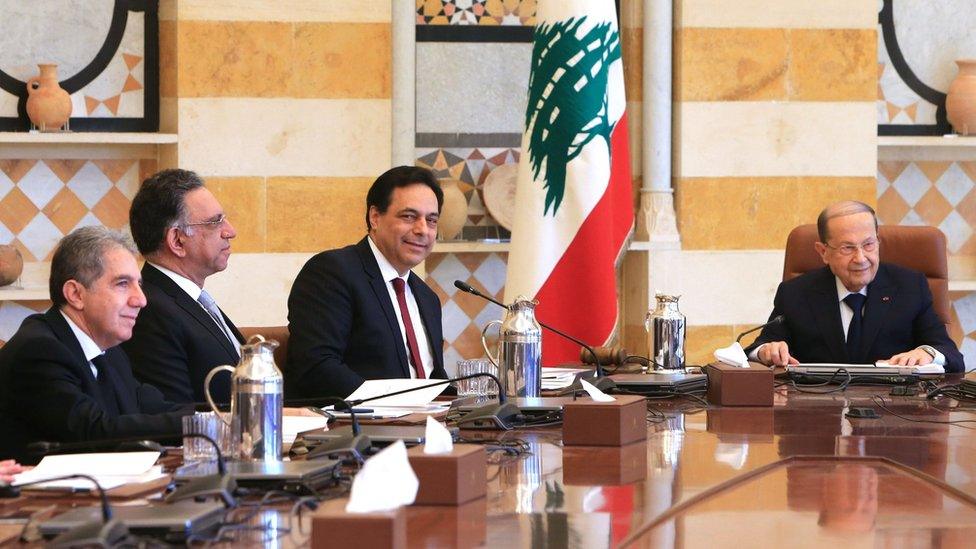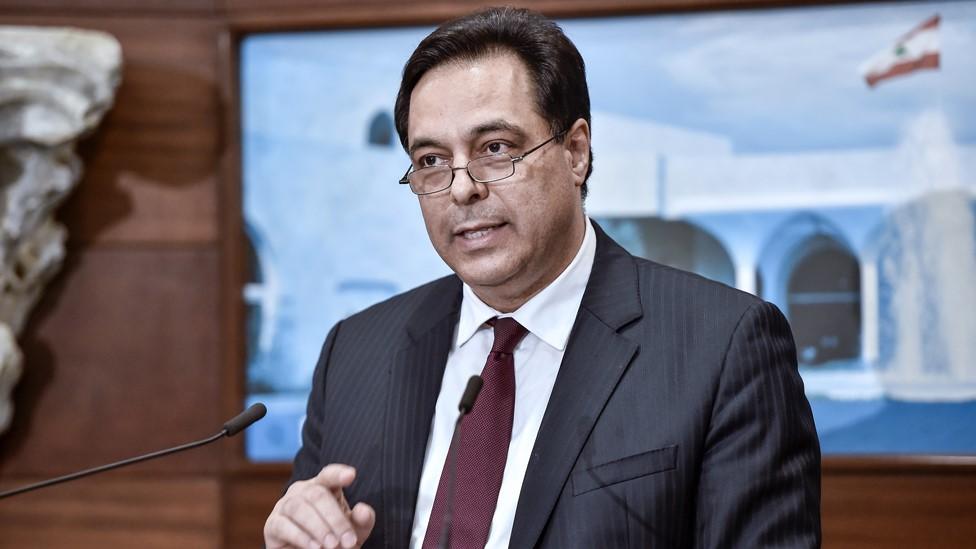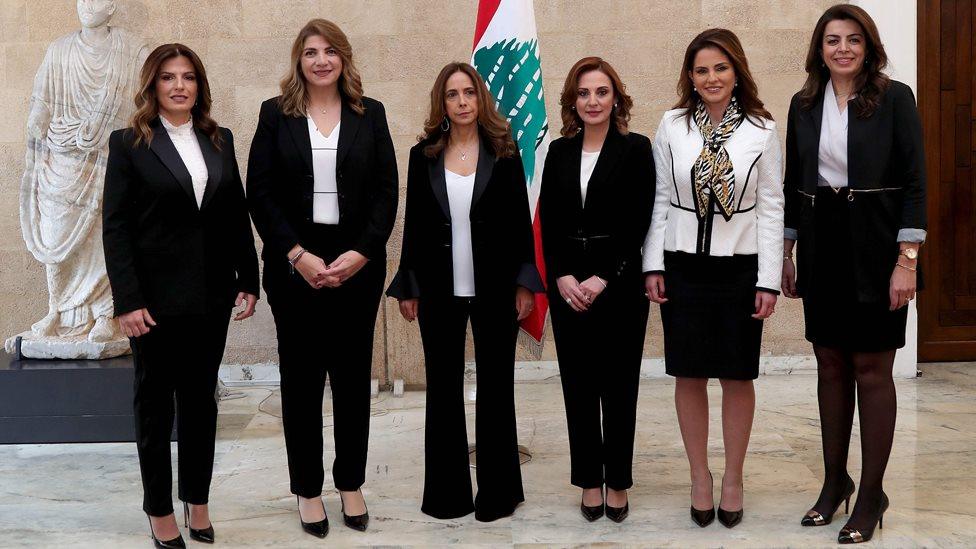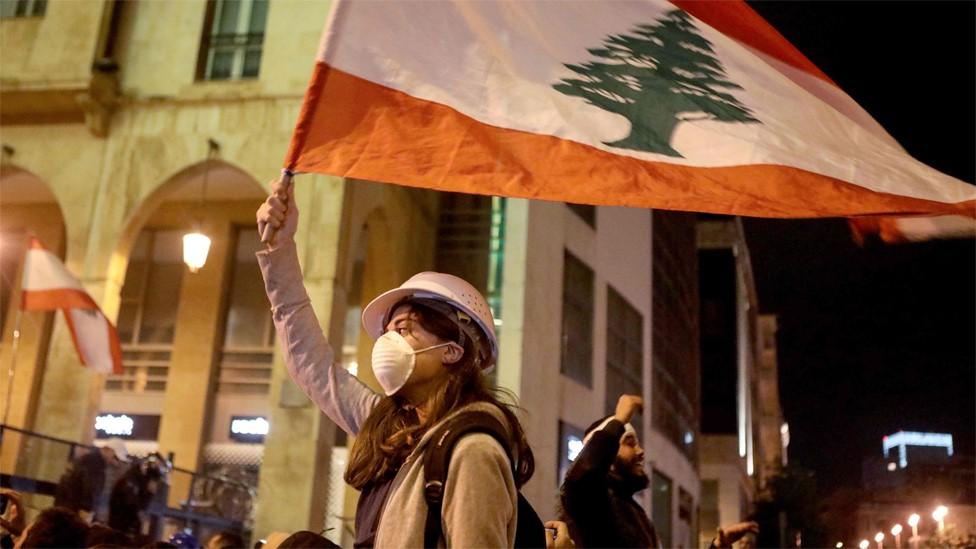Lebanon protests: New government ends months of deadlock
- Published

Prime Minster Hassan Diab (C) held a cabinet meeting at the presidential palace on Wednesday
Lebanon has formed a new government, ending months of deadlock that have left the country adrift as an economic crisis deepens.
Saad Hariri resigned as prime minister in October in response to mass protests over corruption and mismanagement.
The Hezbollah movement and its allies chose university professor Hassan Diab to replace him last month, but they could not agree the cabinet's make-up.
The matter became pressing after the protests recently took a violent turn.
Protesters were quick to reject the new government
More than 460 people were injured in the capital, Beirut, over the weekend as security personnel fired tear gas, water cannon and rubber bullets at demonstrators who threw stones, attempted to invade the parliament building, and vandalised ATMs, bank offices and shops.
At least four young men reportedly suffered severe and irreversible damage to their eyes after being shot at close range with rubber bullets.
Who is in the new cabinet?
Mr Diab is a 60-year-old professor of computer engineering at the American University of Beirut and former education minister who describes himself as an unaffiliated technocrat.
He was nominated to be prime minister - a post that must go to a Sunni Muslim under Lebanon's complex confessional power-sharing system - after Mr Hariri withdrew when other parties rejected his demand to lead a cabinet of specialists.
Mr Diab's candidacy was backed by the biggest Shia Muslim factions, Hezbollah and Amal, and President Michel Aoun's Christian Free Patriotic Movement.
Mr Hariri's Sunni-led Future Movement, the Christian Lebanese Forces party and the Progressive Socialist Party of Druze leader Walid Jumblatt decided not to participate in the new government.

Mr Diab said his government "represents the aspirations of the demonstrators"
After more than a month of negotiations over portfolios, Mr Diab announced on Tuesday night a cabinet of 20 ministers who he insisted had no political loyalties.
Among them are Finance Minster Ghazi Wazni, an economist, and Foreign Minister Nassif Hitti, a former ambassador to the Arab League.
There are six women in the cabinet, including Defence Minister and Deputy Prime Minister Zeina Akar and Justice Minister Marie-Claude Najm.
"This is a government that represents the aspirations of the demonstrators who have been mobilised nationwide for more than three months," Mr Diab said.
He promised it it would "strive to meet their demands for an independent judiciary, for the recovery of embezzled funds, for the fight against illegal gains".

There are six women in the cabinet - a record for Lebanon
Mr Wazni said Lebanon needed foreign aid to save it, likening a looming debt crisis to an approaching "fireball".
But analysts warned that the new government might struggle to drum up the support it needed to begin grappling with the economic crisis because it would not be seen as independent.
"The cabinet is composed primarily of advisers and appointees representing the main political oligarchs and parties allied with Hezbollah," wrote Paul Salem, president of the Middle East Institute, external.
"The cabinet includes a fair number of capable technocrats, but it does not have any political independence to speak of, and on all major matters will likely operate as a shadow government to the four or five men that still cling to power."
How did the protesters react?
Thousands of people took to the streets of Beirut in the hours after the cabinet was announced, complaining that the ministers had been selected by the entrenched political elite that they blame for Lebanon's problems.

Protesters in central Beirut were quick to reject the new government
"We want a new Lebanon, a Lebanon with no corruption," Charbel Kahi, one of the protesters, told AFP news agency. "They are not taking the Lebanese people seriously with this government."
Another protester, Wael Hassaniyeh, told Reuters: "Just like we forced the previous government to step down because it did not meet the demands of the people, the same fate awaits this government, God willing."
Some people threw stones and fireworks at security forces deployed near parliament, prompting officers to fire tear gas and water cannon.
Why have people been protesting?
The demonstrations have been the largest seen in Lebanon in more than a decade.
They have cut across sectarian lines - a rare phenomenon since the devastating 1975-1990 civil war ended - and involved people from all sectors of society.
The BBC's Jeremy Bowen asks why people have been taking to the streets in Lebanon, Iran and Iraq
The protesters have demanded an overhaul of the political system, the formation of an independent, non-sectarian cabinet, and an end to government corruption.
They also want urgent action to resolve Lebanon's economic crisis.
The country's debt is equivalent to more than 150% of gross domestic product (GDP), its economy has stagnated, and the value of its currency, which was pegged to the dollar for more than two decades, has plummeted.
The country's public infrastructure, which was already stretched before more than one million refugees arrived from neighbouring Syria, is also ailing. Electricity and water supplies are disrupted frequently and rubbish often piles up on the streets.